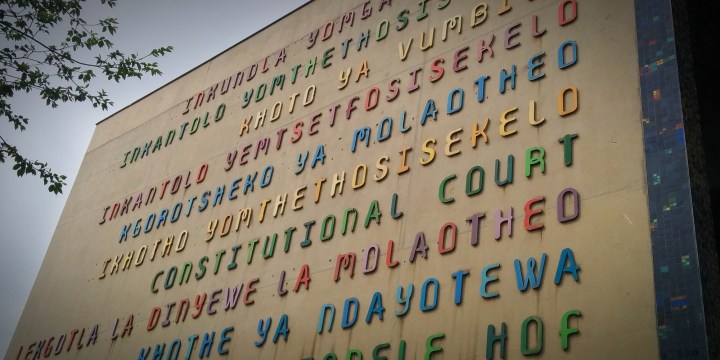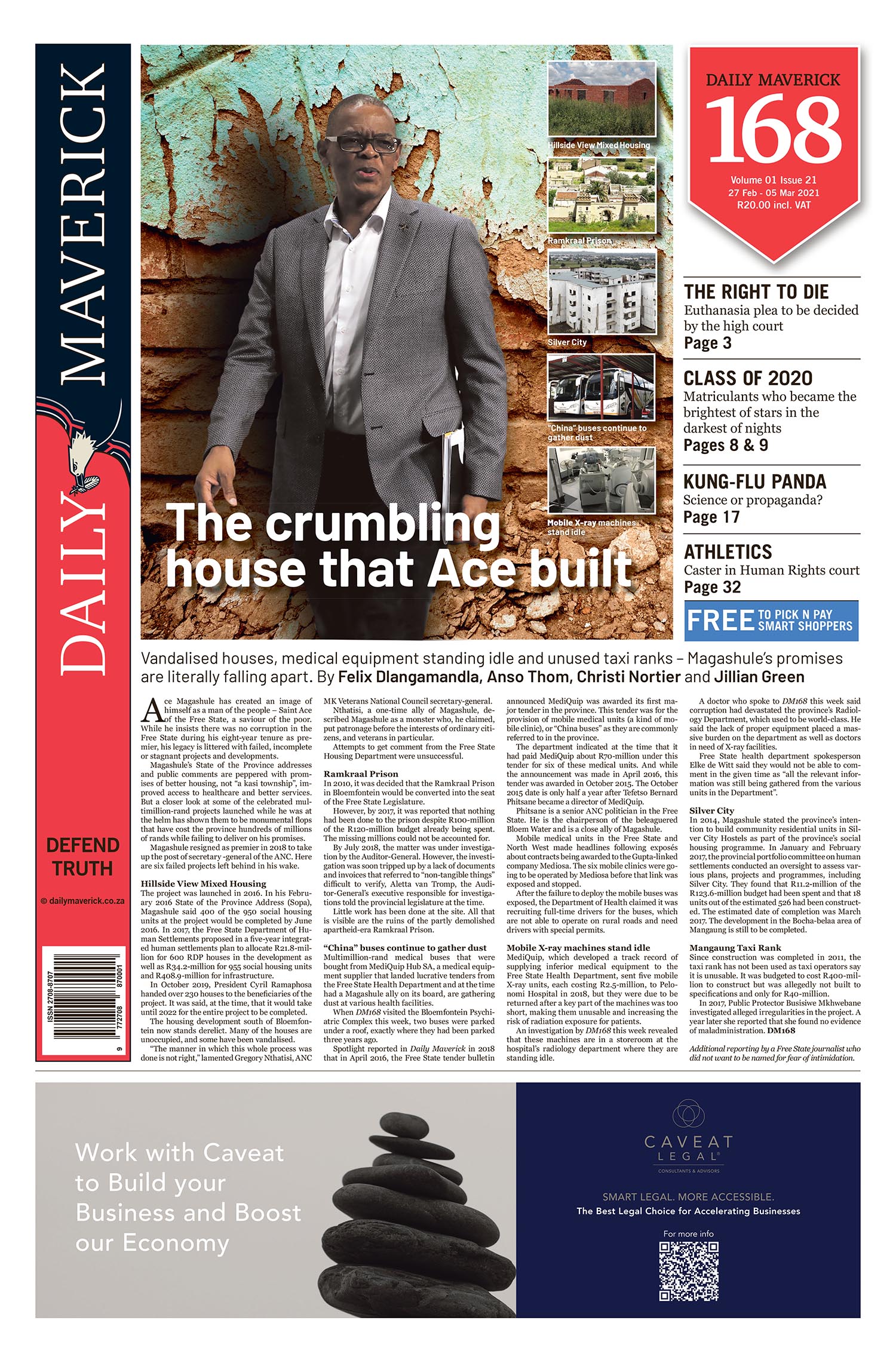DM168 Reflection
Let’s not stay locked in our little monolingual worlds

The majority of South Africans have done a superb job at multilingualism. But that is often a self-driven, informal process. We have a long way to go towards developing better teaching techniques and to encourage more equitable proficiency in languages.
First published in the Daily Maverick 168 weekly newspaper.
A nostalgic sepia-coloured photo was posted on our three-generation family WhatsApp group the other day. This miserable Covid-19 pandemic tends to trigger nostalgia.
My mother’s handwritten caption was: “Off to Taal Plaas Sept 1974”. The nine-year-old me was framed by a train window. A messy DIY haircut framed my scrunched-up face of bewilderment and fear as I forced a smile before departing for a weekend away to learn Afrikaans on a farm outside Cape Town.
My well-intentioned, tweetalige parents reckoned that I needed to sharpen my Afrikaans. We lived in a community devoid of diversity, as was typical at the height of the apartheid era. The whites-only co-ed government school I attended was virtually monolingual, with Afrikaans (never mind other languages) rarely heard on school grounds, except in Taal classes and among some of the staffing community.
My mom responded on our WhatsApp group: “I can’t bear the pain on Janet’s face. It’s the saddest picture ever. Didn’t help her Afrikaans, did it?”
At the weekend camp, we were banned from saying “Good morning” or uttering any words in English, and monitors would circulate the farm to snoop on us. I recall sneaking off with my friend Anthea and lying low alongside the animal pens to whisper in our mother tongue.
As history has shown repeatedly, coercion sparks rebellion. The June uprisings of 1976 were sparked among the youth after the apartheid government forced Afrikaans on to black schools as a medium of instruction.
Back in my privileged bubble, that weekend on the farm was among the longest two days of my life. Taal Plaas was a spectacular fail. Any passion I may have had for the language died on that farm. Afrikaans – the only African language option available back then – remained the lowest point on my report card through to matric.
Not a lot has changed
Fast forward to my own parenting brilliance in the post-apartheid 21st century. On a mission for my two children to embrace indigenous languages, and regretting that I had been too self-conscious to experiment fully with multilingualism instead of reverting to the comfort zone of English in my working and personal life, I forced Ella to continue Xhosa classes in Grade 8.
She had wanted to take French. She was angry with me for forcing her hand.
She got me back by consistently failing Xhosa every term – by far the low-est mark on her report card. I relented and let her drop out after Grade 9. Like my Taal Plaas experience, another fail.
These memories lingered after I stumbled on a social media post advertising that 21 February was International Mother Language Day. Proclaimed by Unesco in 1999 to promote linguistic and cultural diversity, the day passed by unnoticed, besides lip service.
So, as a country with 11 official languages, how far have we embraced multilingualism, 27 years into democracy?
Among those who speak English as their mother tongue, not a lot has changed, especially in the Deep South of Cape Town, where I live. The majority of South Africans draw on a rich linguistic tapestry, but English-speakers are generally bilingual at best. They are tone-deaf to multilayered conversations around them. They are accustomed to everyone politely using English.
A helpful way to learn a language is to read the signage and listen to the conversation around you – on streets, TV, radio, and in your community. If you don’t see the written words, or hear them, they remain “foreign”. If everyone around you defaults to English, it is easy to stay in your narrow lane.
The majority of South Africans have done a superb job at multilingualism. But that is often a self-driven, informal process. We have a long way to go towards developing better teaching techniques and to encourage more equitable proficiency in languages.
More recently, my young adult son has indicated a curiosity in broadening his linguistic reach.
After matric, Tyler rekindled his passion for Xhosa (a subject in Grades 1 to 4) in conversations on the street and taxi trips to Animation School in Woodstock. He would make a concerted effort to get out of his mlungu comfort zone and to greet people in other languages, which often led to deeper interactions. He pushed aside that awkward, self-conscious feeling.
As is so often the case, music was another source of his inspiration, notably a rap song, Ndingumlungu, by Craig Makhosi Charnock, the founder of Ubuntu Bridge, a Xhosa language centre. Tyler enrolled at the centre’s six-week conversational isiXhosa class after getting his first paid job in 2019. Since then, his vocabulary has been slowly expanding, opening up doors of enrichment.
A ‘rare novelty on display’
Charnock, who performed as Quite a White Ou (a wordplay on kwaito), has a TEDxCapeTown talk from 2012. He described his personal story of learning Xhosa as a young adult and the transformative power it had on his life: the impact of speaking isiXhosa on his relationships and his perspective.
Charnock refers to Nelson Mandela (of course) and reminds his mainly white audience that Madiba made a concerted effort to learn the language and culture of his oppressor so he could sit at a table to talk reconciliation. He quoted Mandela: “If you talk to a man in a language he understands, that goes to his head. If you talk to him in his language, that goes to his heart.”
Yet Charnock said that when he speaks Xhosa it is a “rare novelty on display” – just a basic simple greeting in isiXhosa elicits a warm response. This shows just how far we still have to go.
Charnock reminds us that to try to speak another language is a basic sign of respect. It got me thinking. When white people travel overseas, they make an effort to at least exchange niceties in other languages, so why not here at home? Come on, let’s make an effort. DM168
Janet Heard is a managing editor at Daily Maverick.
This story first appeared in our weekly Daily Maverick 168 newspaper which is available for free to Pick n Pay Smart Shoppers at these Pick n Pay stores.




















 Become an Insider
Become an Insider
Niceties? Smacks of touristy paternalism. There is absolutely no reason why all SA kids shouldn’t speak more the one language fluently and most do. This article and its sentiment are way past sell-by-date.